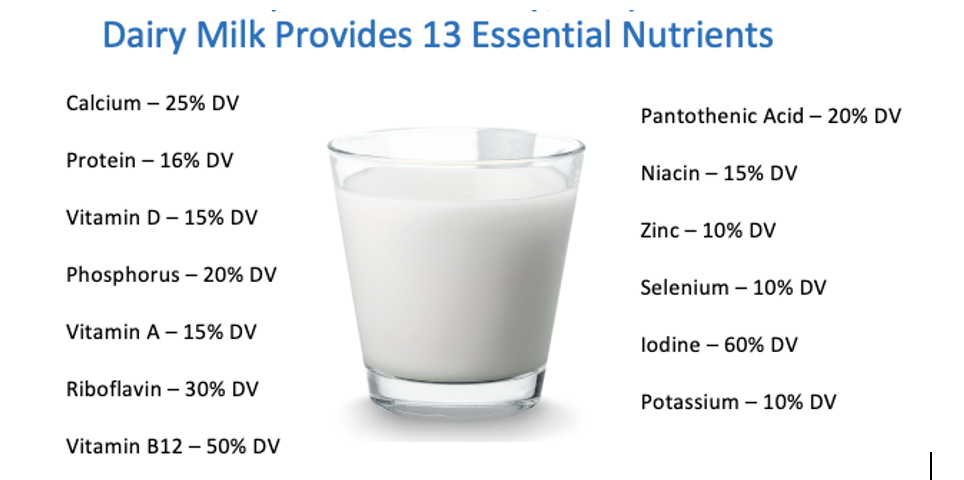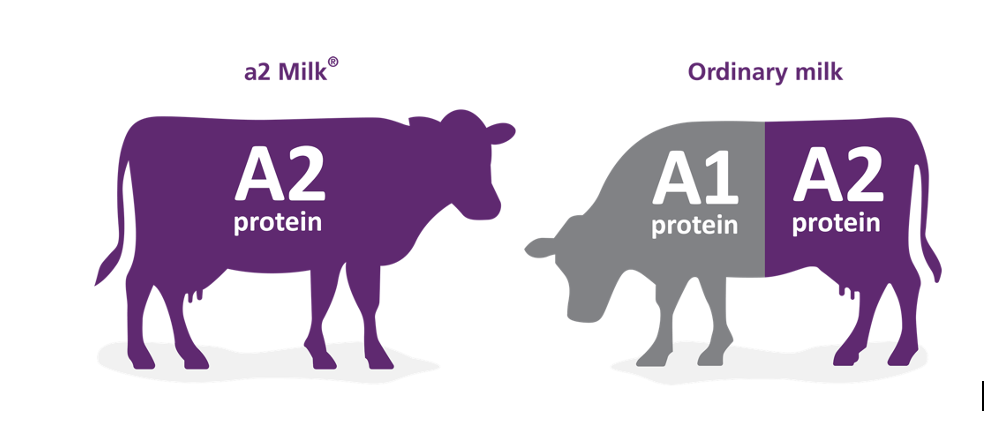Stomach discomfort is incredibly common and at times, difficult to figure out. However, there are a few simple steps you can take to help you get to the root cause of your digestive distress. And, if you think dairy is the culprit, it is very important to figure out if dairy is indeed problematic and if so, what aspect of dairy is causing your issues. By doing this you will not unnecessarily remove foods, and therefore nutrients, from your diet.

What you will learn in this article:
- Stomach issues can lead to more problems than discomfort
- Why you shouldn’t cut out dairy
- What if it isn’t lactose intolerance?
- Research on a2 Milk®
- My experience with perceived lactose intolerance and a2 Milk®
Digestive issues can cause more than just pain, gas, bloating and other common symptoms. When people self-diagnose, they often fumble around taking a combination of foods out of their diet to see if they can find the culprit. In the process they may be unnecessarily avoiding nutrient rich foods. They might also fall short on fiber, protein or total calories. Over time, avoiding various nutrient-rich foods may compromise your intake of vitamins and minerals and therefore your health. Depending on the nutrients you are missing out on, you may experience fatigue, muscle soreness, delayed healing, brain fog and more. If you are training regularly, you might not see the results you are looking for. Plus, if you pop over the counter medications you don’t need, you may be doing more harm than good.
You Shouldn’t Cut Out Dairy
If you think lactose is the issue, you might be tempted to cut out all dairy. After all, you can replace milk with a dairy alternative and eat coconut yogurt, right? Not exactly. It isn’t easy to replace the nutrients found in dairy foods.
Cow’s milk offers a unique nutrient package including 13 nutrients. In fact, dairy foods contribute the following amount of each nutrient to the U.S. Diet:
- 70% calcium
- 30% phosphorus
- 25% riboflavin
- 18% protein
- 18% vitamin B12
- 16% vitamin A
- 16% potassium
- 15% zinc*
- 14% magnesium*
- Vitamin D*
This is why the Dietary Guidelines for Americans include dairy foods (fat free and low-fat milk, yogurt and cheese) as part of healthy dietary patterns. For those who choose a dairy alternative, the Guidelines recommend a fortified soy milk that contains calcium and vitamins A and D. The Guidelines specifically state other products that are sold as milk from plants including almond, rice, coconut, hemp, oat and others are not included in the dairy milk category because their nutrition content is not similar to dairy milk. Therefore, these plant milks cannot be considered a replacement for dairy. You cannot squeeze rice into water and expect to get the same nutrition value as dairy milk.

What if it isn’t Lactose Intolerance?
Many people assume lactose intolerance is causing their discomfort after drinking milk. Yet they don’t investigate further. However, the issue might not be lactose intolerance but instead a sensitivity to A1 beta casein.
The two main proteins in milk are whey and casein. Originally, all cows produced only the A2 beta casein and no A1 beta casein. A1 was a natural mutation that occurred through modern farming practices in European herds and then spread throughout the world. Now there are two types of beta casein in milk: A1 and A2. Conventional milk contains 75% A1 and 25% A2. Milk from Jersey cows contains 25% A1 and 75% A2. a2 Milk® contains only A2 beta casein.
a2 Milk® comes from cows that naturally produce only pure A2 protein, which is easier on digestion and may help avoid stomach discomfort. a2 Milk® is 100% real dairy milk from local US farms. Therefore, a2 Milk® contains all of the nutrients found in dairy milk.
Research on a2 Milk®
A new study out of Purdue University finds that some people who suffer from stomach discomfort after drinking regular milk may significantly reduce their symptoms if they drink milk that contains only A2 protein.
In this study, researchers evaluated patients with perceived lactose intolerance. In a double-blind, crossover manner, they gave study subjects 4 different types of milk to evaluate the gastrointestinal tolerance of milk containing different concentrations of A1 and A2 β-casein proteins as indicated in the graphic below.

Those with true lactose intolerance had fewer symptoms and no delay in gastrointestinal transit after consuming a2 Milk® compared to conventional milk even though a2 Milk® has an equally high lactose content.The study authors speculated that gastrointestinal symptoms associated with milk consumption in those with lactose intolerance may actually be attributed to the presence of A1 β-casein, not lactose.
Also, the total symptom score for abdominal pain was lower in all maldigesters (not just those with lactose intolerance) after drinking milk with A2 β-casein only compared to conventional milk.
My experience with perceived lactose intolerance and a2 Milk®
No one who has ever come to me with what they think is lactose intolerance has ever been tested. And this is fine because though breath testing can confirm or deny lactose malabsorption, it can’t help guide dietary restrictions. So, for me it’s close to useless. I would rather work with a person to find out what they can tolerate and make sure they have the most nutrient rich diet possible.
And I’ve had several cases where people think dairy is the issue and it turns out they can tolerate some if not all dairy products. I have also had 2 athletes recently who avoided milk due to what they thought was lactose intolerance (both have IBS). After trial and error we discovered they could enjoy a2 Milk® as well as hard cheeses without any issues. By adding real dairy milk back to their diet we were able to improve their nutrient intake.
Stomach discomfort can take a toll on your health and well-being. If you believe your stomach issues are coming from dairy, try a2 Milk® since it is easier on digestion and may help some avoid discomfort. When trying a2 Milk®, do not consume any other dairy products. a2 Milk® contains the same amounts of calcium and other important minerals and nutrients as cows’ milk because it is real cows’ milk. Click here to find out where you can buy a2 Milk®.
This blog was sponsored by a2 Milk®.